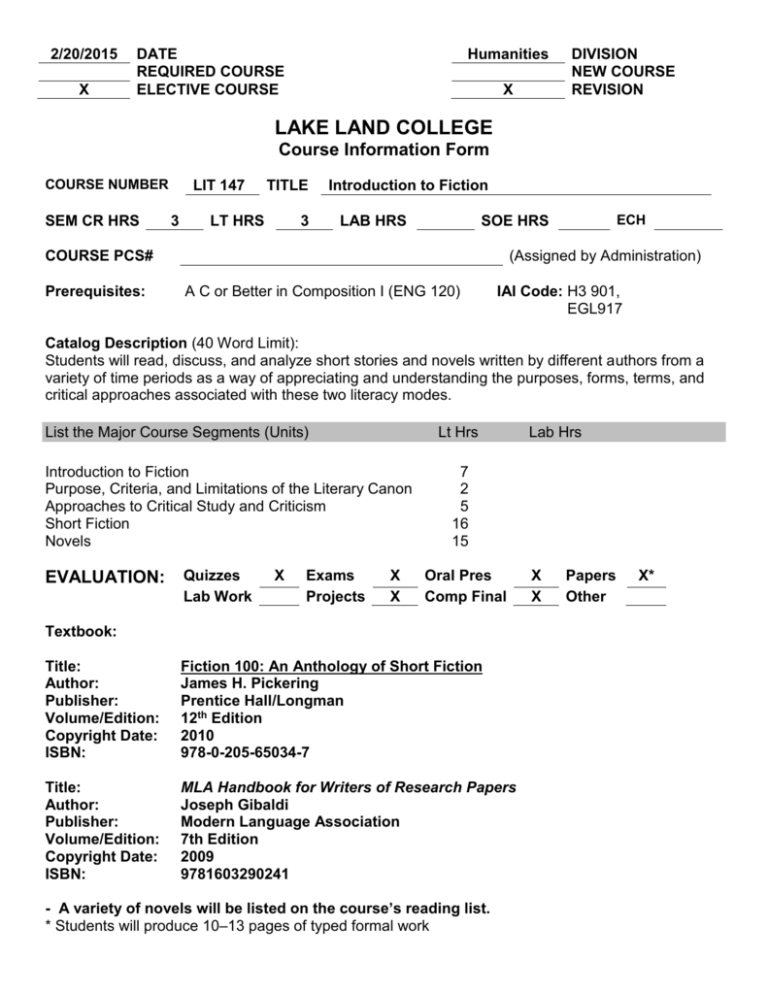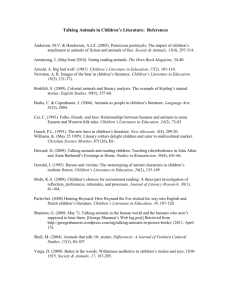ECH - Lake Land College
advertisement

2/20/2015 X DATE REQUIRED COURSE ELECTIVE COURSE Humanities X DIVISION NEW COURSE REVISION LAKE LAND COLLEGE Course Information Form COURSE NUMBER SEM CR HRS LIT 147 3 TITLE LT HRS 3 Introduction to Fiction LAB HRS COURSE PCS# Prerequisites: ECH SOE HRS (Assigned by Administration) A C or Better in Composition I (ENG 120) IAI Code: H3 901, EGL917 Catalog Description (40 Word Limit): Students will read, discuss, and analyze short stories and novels written by different authors from a variety of time periods as a way of appreciating and understanding the purposes, forms, terms, and critical approaches associated with these two literacy modes. List the Major Course Segments (Units) Lt Hrs Introduction to Fiction Purpose, Criteria, and Limitations of the Literary Canon Approaches to Critical Study and Criticism Short Fiction Novels EVALUATION: Quizzes Lab Work X Exams Projects X X Lab Hrs 7 2 5 16 15 Oral Pres Comp Final Textbook: Title: Author: Publisher: Volume/Edition: Copyright Date: ISBN: Fiction 100: An Anthology of Short Fiction James H. Pickering Prentice Hall/Longman 12th Edition 2010 978-0-205-65034-7 Title: Author: Publisher: Volume/Edition: Copyright Date: ISBN: MLA Handbook for Writers of Research Papers Joseph Gibaldi Modern Language Association 7th Edition 2009 9781603290241 - A variety of novels will be listed on the course’s reading list. * Students will produce 10–13 pages of typed formal work X X Papers Other X* Major Course Segment Hours Learning Outcomes Students will be able to: - Demonstrate, by generating a number of oral and written in class responses, presenting a formal presentation, and satisfactorily completing midterm and comprehensive final exams: What motivates people to read and what motivates writers to produce literary texts; the cultural and historical factors influencing the reader, writer, and text; how fiction relates to a reader’s understanding of his/her world; and the basic concerns, themes prevalent in fiction. Introduction to Fiction 7 Purposes, Criteria, and Limitations of the Literary Canon 2 - Produce a variety of oral and written in class responses and successfully responding to essay questions asked on the comprehensive final exam, knowledge of the literary canon and the debate surrounding the works it includes and excludes. Approaches to Critical Study and Criticism 5 - Produce a number of oral and written in class responses, writing a formal and typed critical analysis, and by satisfactorily completing the comprehensive final exam. Short Fiction 16 - Demonstrate an ability to discuss, examine, and appreciate a variety of short stories by completing a number of quizzes, presenting formal individual/group presentations, producing formal, typed literary responses, and performing satisfactorily on midterm and comprehensive final exams. - Demonstrate a familiarity with the terms used when analyzing fiction and study stories presenting views that are possibly contrary to their own; stories underscoring the significance of gender, race, religion, and nationality; stories emphasizing class structures and social constructs; and stories that focus on key ethical and moral dilemmas by completing a variety of in class quizzes, producing formal, typed, one page responses to questions posed, and satisfactorily responding to questions posed on the comprehensive final exam. Novels 15 - Demonstrate a familiarity with the history of the novel, the evolving form of the novel, the common themes prevalent in such works, and the major novelists of the 19th and 20th centuries by generating a number of oral and written responses in class, and satisfactorily completing the midterm and comprehensive final exam. - Demonstrate an ability to read, study, interpret, and interact with a number of novels produced during a variety of time periods by presenting formal individual/group presentations, participating in student-directed discussions, completing quizzes, producing oral and written responses to questions posed in class, producing formal, typed literary analyses, and responding adequately to questions asked on the midterm and comprehensive final exams. General Education Goals Communication Students will communicate professionally and effectively through a. Reading b. Listening/Observing c. Speaking d. Writing Critical Thinking Students will apply critical thinking skills through a. Locating information b. Evaluating sources c. Analyzing data and arguments d. Interpreting initial results e. Transferring insights to new contexts Foundational Knowledge Students will demonstrate foundational knowledge in the liberal arts and sciences. Course Outcomes: At the successful completion of this course, students will be able to: Demonstrate an understanding of the motivation behind why certain controversial texts were viewed as inappropriate and whether those arguments are valid.





